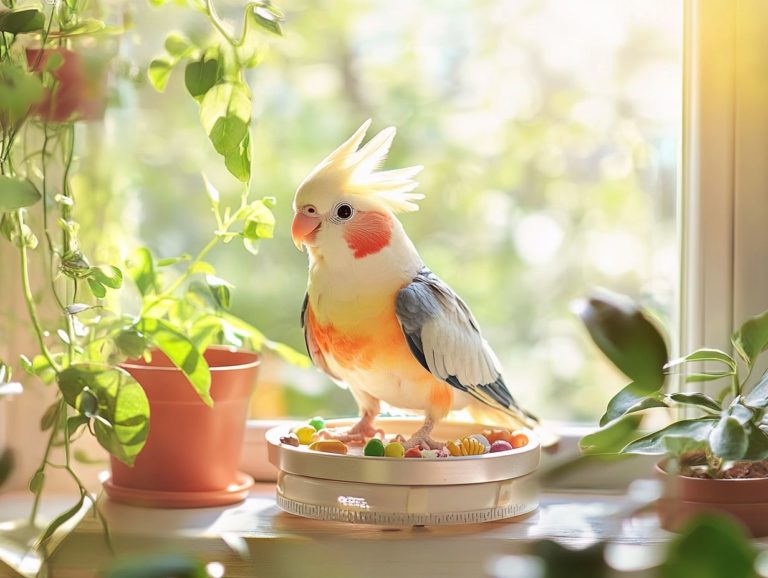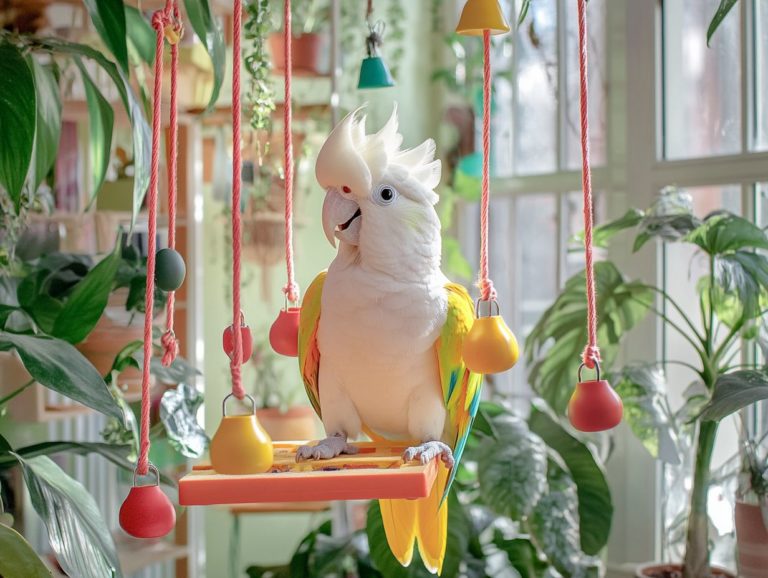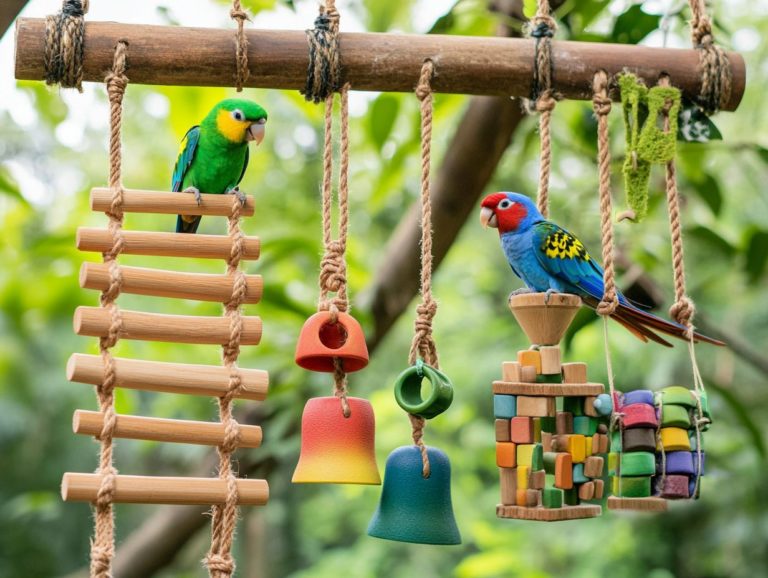Parakeet Personality: Understanding Their Behavior
Parakeets are not just colorful companions; they are captivating creatures, each with its own distinct personality and behaviors.
By understanding what makes these birds unique, you can greatly enhance your experience as a pet owner. This article explores parakeet behavior, revealing common actions and their meanings, as well as the various factors that influence their moods.
You will learn how to create a nurturing environment, use effective training techniques, address common behavioral issues, and strengthen your bond with your feathered friend.
Immerse yourself in this exploration to enrich not only your life but also that of your parakeet!
Contents
- Key Takeaways:
- Understanding Parakeet Behavior
- Creating a Positive Environment for Your Parakeet
- Training Your Parakeet
- Dealing with Common Behavior Issues
- Bonding with Your Parakeet
- Frequently Asked Questions
- What factors influence a parakeet’s personality?
- Do parakeets have distinct personalities?
- How can I tell if my parakeet is happy or stressed?
- Can a parakeet’s personality change over time?
- Are there any common personality traits among parakeets?
- How can I help my parakeet develop a well-rounded personality?
Key Takeaways:
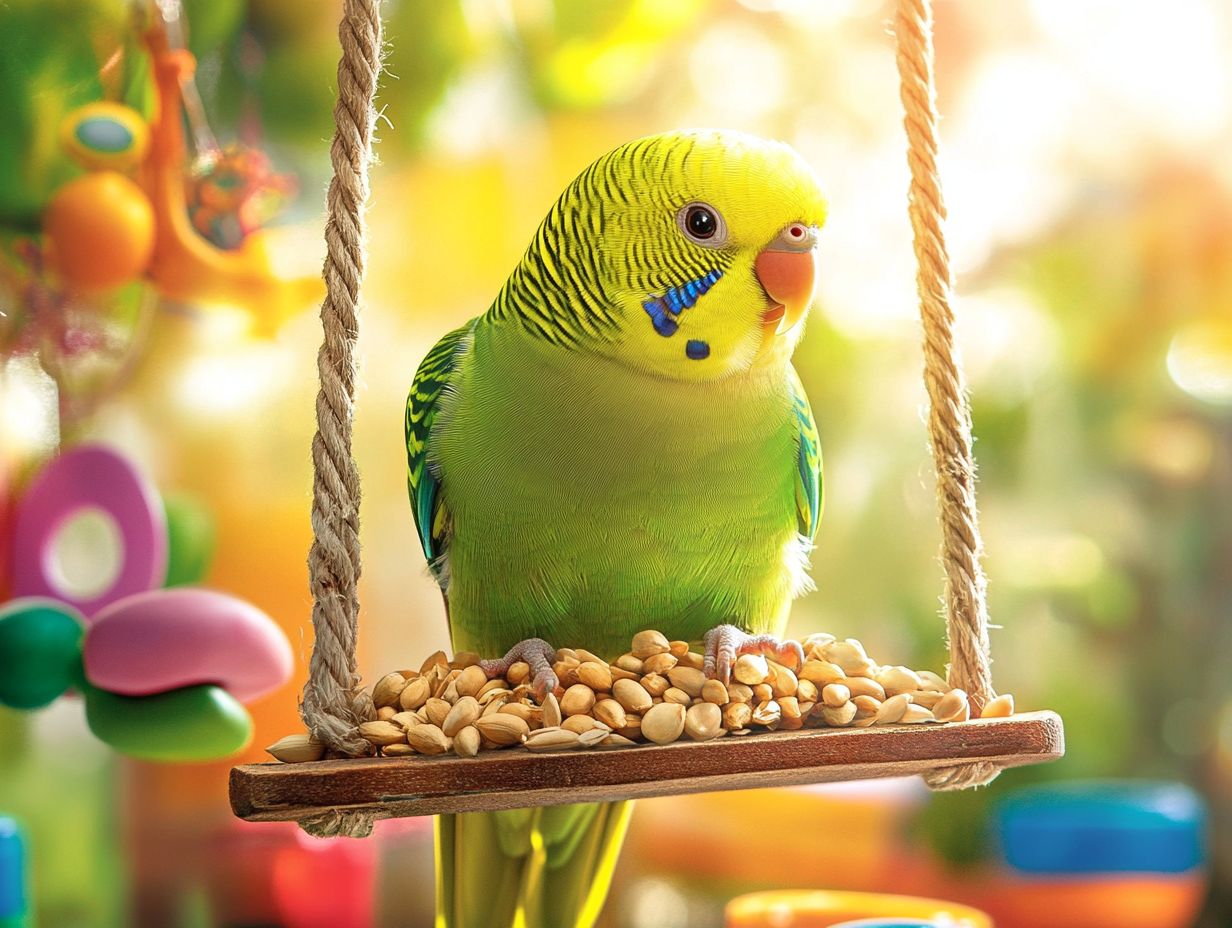
- Parakeets have unique personalities and behaviors that make them special pets.
- Understanding parakeet behaviors and their meanings helps create a positive environment.
- Train effectively and bond with your parakeet to solve behavior issues.
What Makes Parakeets Unique?
Parakeets, or budgerigars, are truly one-of-a-kind pet birds that dazzle with their vibrant colors and captivating personalities. You ll notice they display a range of behaviors reflecting their affectionate nature, especially in interactions with you and other birds.
With various breeds like the Indian Ringneck and Quaker Parakeet, each brings its own charm and distinct characteristics, making them delightful companions. Their impressive vocal skills will enchant you, as they can learn and mimic sounds like their larger relatives, the African Grey and Amazon parrots.
These charming birds love to connect with you, bringing joy to your home! Socialization is crucial for their development; when you provide ample interaction, they truly flourish and enjoy vocal conversations and singing along to your favorite tunes.
They express their affection not only through physical closeness and preening but also through a variety of behavioral nuances. Some may be a bit reserved, while others are naturally outgoing, eager to explore their surroundings, highlighting the rich diversity in personalities within the parakeet family.
Understanding Parakeet Behavior
Understanding parakeet behavior is key to your success as a bird owner. These affectionate creatures display many social signals and habits that shape their interactions with you and other species.
By recognizing these behaviors, you can build a positive relationship with your parakeet, creating a harmonious environment for both of you.
Common Behaviors and Their Meanings
Common behaviors exhibited by parakeets provide valuable insights into their emotions and needs, making them a fascinating subject for anyone who loves pet birds. Understanding these behaviors like preening and bonding can enhance your interactions with your feathered companions, fostering a deeper connection rooted in affection and care.
For instance, when your parakeet engages in preening, it’s not just about keeping its feathers in top shape; it s also a sign of comfort and trust in its surroundings. These little birds are known for their vocalizations, or sounds they make, ranging from cheerful chirps to expressive squawks, each signaling different emotional states. A playful parakeet may show off its energetic nature by climbing and swinging around, putting on quite the show.
By observing these nuances, you can effectively interpret your pet’s mood, ensuring its needs for social interaction and mental stimulation are met. This ultimately leads to a happier, healthier bird one that thrives in your care.
Factors That Influence Behavior
Your parakeet’s behavior is shaped by several factors. These include chances to socialize, habitat conditions, and the bird’s sex.
Male parakeets are usually more vocal and may show different behaviors compared to females. This reflects their unique personalities and social needs.
The environment plays a crucial role in their well-being. Spacious and enriched habitats encourage exploration and interactive play. In contrast, a cluttered or stressful setting can lead to anxiety or aggression.
When parakeets interact, they establish complex hierarchies and social bonds. These can change based on individual personalities. For instance, younger parakeets may be more playful and curious, while older birds might display dominance or territorial behaviors.
Understanding these dynamics is essential for fostering healthy social interactions. This ensures that each parakeet, regardless of sex, can thrive in its space. Factors like diet and daily routines also significantly affect their behavior.
Creating a Positive Environment for Your Parakeet
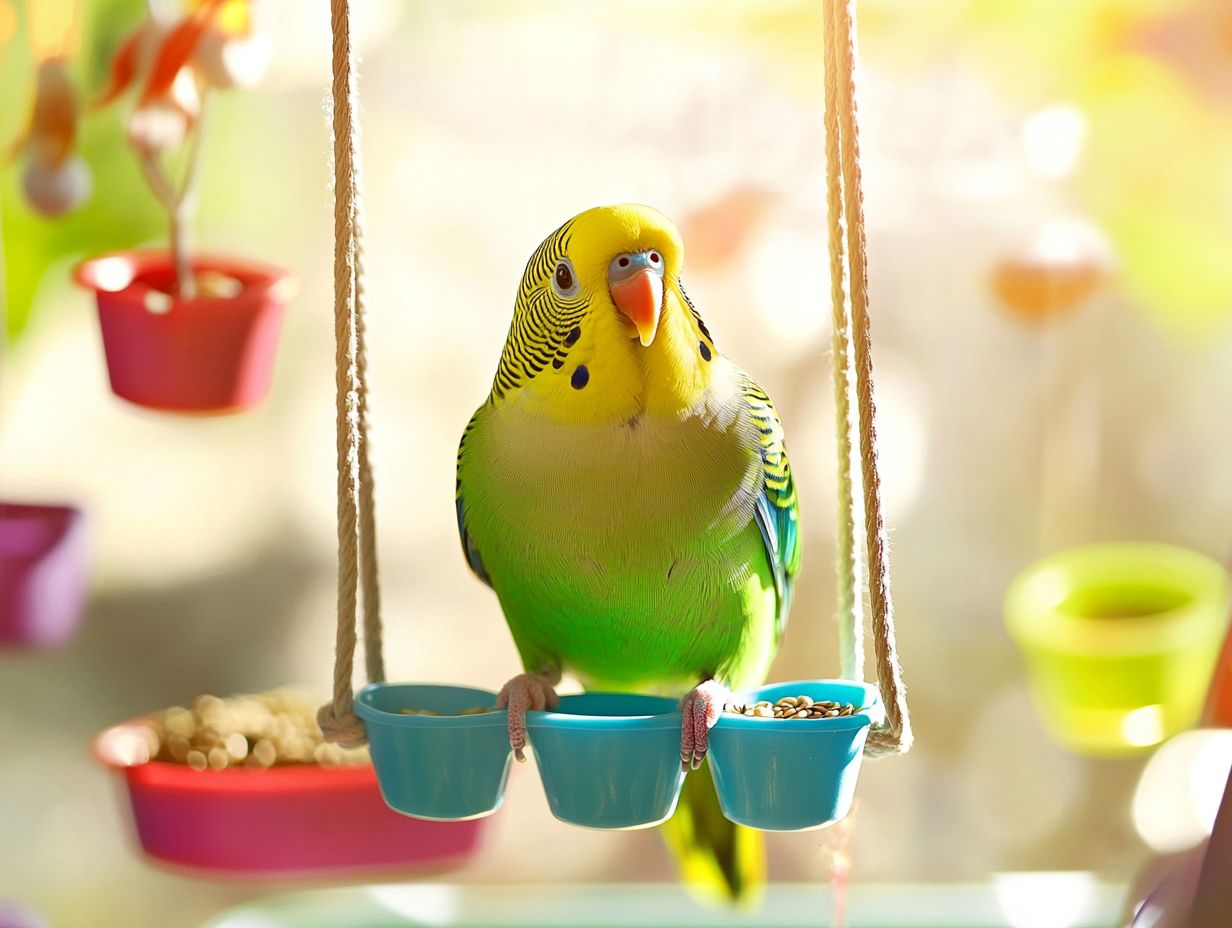
Creating a positive environment is essential for your parakeet s happiness! Key components include proper bird care practices, plenty of exercise opportunities, and stimulating toys to keep boredom at bay.
By nurturing this atmosphere, you strengthen your bond with your feathered friend. It encourages healthy behaviors that lead to a vibrant and fulfilling life for your pet.
Essential Elements for a Happy Parakeet
To ensure your parakeet enjoys a happy and healthy life, incorporate several essential elements into its daily routine. These include proper feeding practices, socialization with other birds and humans, and regular grooming sessions that promote overall well-being.
Providing a balanced diet rich in seeds, pellets, and fresh fruits is crucial. This not only sustains energy levels but also keeps feathers looking vibrant. Engaging in interactive play and creating socialization opportunities can elevate your parakeet s mood. A sense of companionship and security is what every bird craves.
Regular grooming such as gentle feather care and beak maintenance keeps your feathered friend comfortable and healthy. Additionally, create an exciting space that feels like home for your parakeet. Use perches and fun toys to keep it happy and engaged.
Ultimately, these thoughtful practices enable your parakeet to thrive in a happy home.
Training Your Parakeet
Training your parakeet does more than expand its vocabulary; it deepens the connection between you and your feathered friend. This fosters enriching interactions.
Using effective training techniques, you can witness impressive advancements in your parakeet’s communication skills and its ability to engage with both its surroundings and you.
Effective Training Techniques
Effective training involves using consistent commands and positive reinforcement. This enables you to teach your pet to mimic sounds and even hold conversations. Male parakeets, in particular, are known for their vocal talents, making them excellent candidates for training and bonding exercises.
Clicker training can be a game changer in this process. The sound of the clicker signals desired behavior, allowing you to reward your bird with immediate praise or a small treat. This technique reinforces good habits and deepens the bond between you and your parakeet.
Vocal reinforcement is also vital. Consistently repeating phrases or sounds encourages your parakeet to imitate them. By recognizing and responding to their unique signals, you create a more engaging environment that leads to enriched interaction and promotes a strong communicative relationship with your avian companion.
Dealing with Common Behavior Issues
Navigating common behavior issues in parakeets is an essential part of bird care that can significantly influence the bond you share with your pet. Challenges like parakeet aggression or signs of distress need your attention and understanding.
By addressing these issues thoughtfully, you can improve your feathered friend s well-being and create a harmonious living environment for both of you.
Aggression, Biting, and Other Challenges
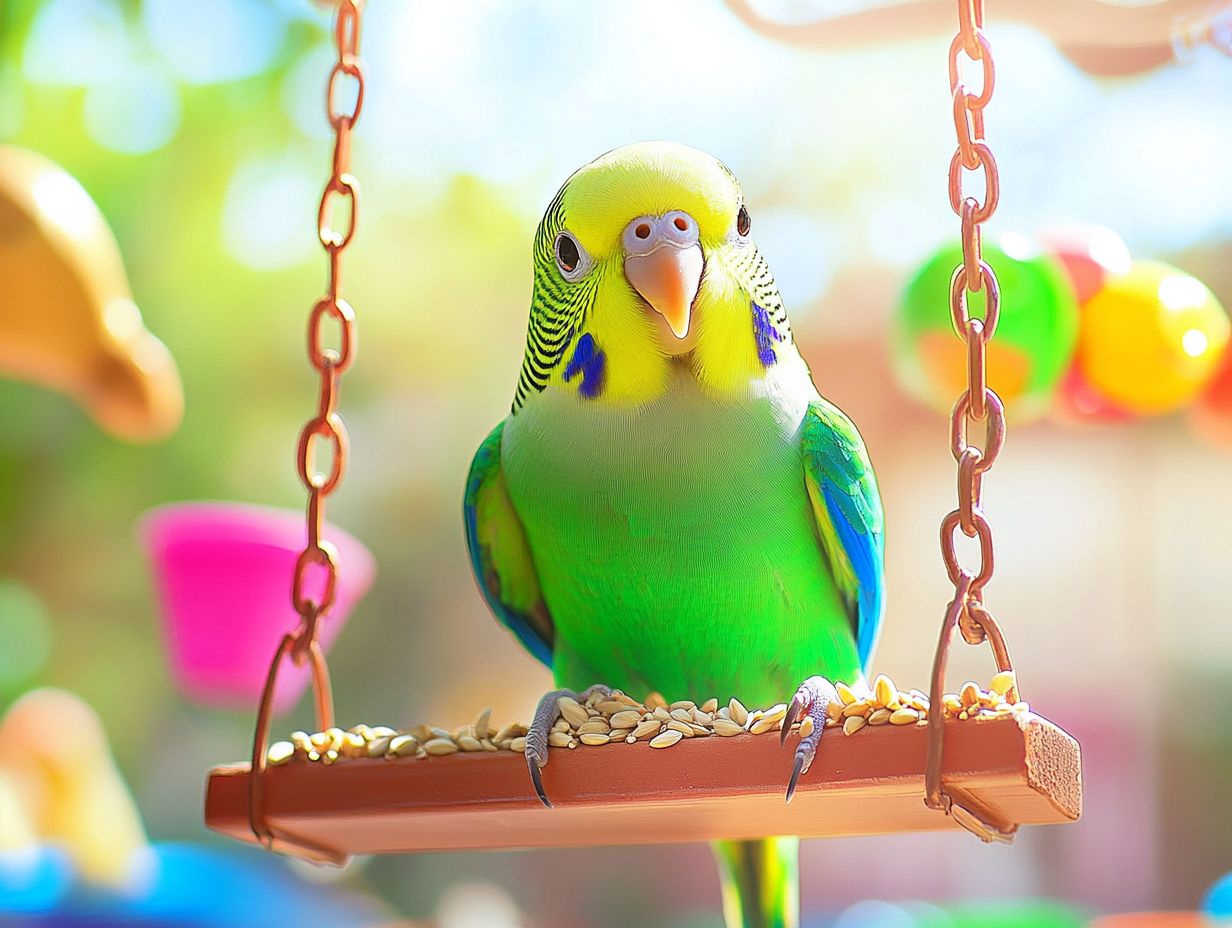
Parakeet aggression and biting can often arise from stress, fear, or a lack of social interactions. To tackle these issues and build healthier relationships with your feathered friends, it s crucial to understand the underlying causes by closely observing their signals.
These behaviors frequently emerge in response to changes in their environment or inadequate interaction with you. Parakeets are inherently social beings; when they sense neglect or feel threatened, they might display aggressive actions to protect themselves.
Recognizing the signs of discomfort or stress is essential whether through vocalizations or body language. To address these challenges, consider implementing gradual training sessions and enriching their environment.
Using positive reinforcement techniques, such as rewarding calm behavior, can help you build trust and ultimately reduce aggression while promoting a more harmonious coexistence.
Bonding with Your Parakeet
Bonding with your parakeet can be an exciting adventure filled with love and companionship! By taking the time to understand your parakeet’s emotions and engaging in interactive activities, you can create a strong relationship based on trust and affection.
This not only enhances the joy of having a pet bird but also enriches your overall experience as a devoted bird owner.
Building a Strong Relationship
Building a strong relationship with your parakeet requires a keen understanding of its unique behavior and a commitment to regular interactions that promote trust and companionship. Engaging directly with your feathered friend can lead to a more harmonious living environment and deeper emotional bonds.
Routine interactions whether chatting, playing, or offering treats can significantly enhance your connection. By observing their body language and vocalizations, you gain invaluable insight into their needs and moods.
Engage in targeted playtime to encourage your parakeet to explore safe toys. This not only stimulates their mind but also reinforces the companionship you share. Creating a serene environment with minimal stressors is crucial to developing that trust.
Through consistent interaction and genuine attentiveness to their behavior, you can nurture a lasting and fulfilling relationship, ensuring both you and your avian companion thrive together.
Frequently Asked Questions
Here are some common questions about parakeet behavior and personality:
What factors influence a parakeet’s personality?
Several factors can influence a parakeet’s personality, including genetics, early socialization, and environmental conditions.
Do parakeets have distinct personalities?
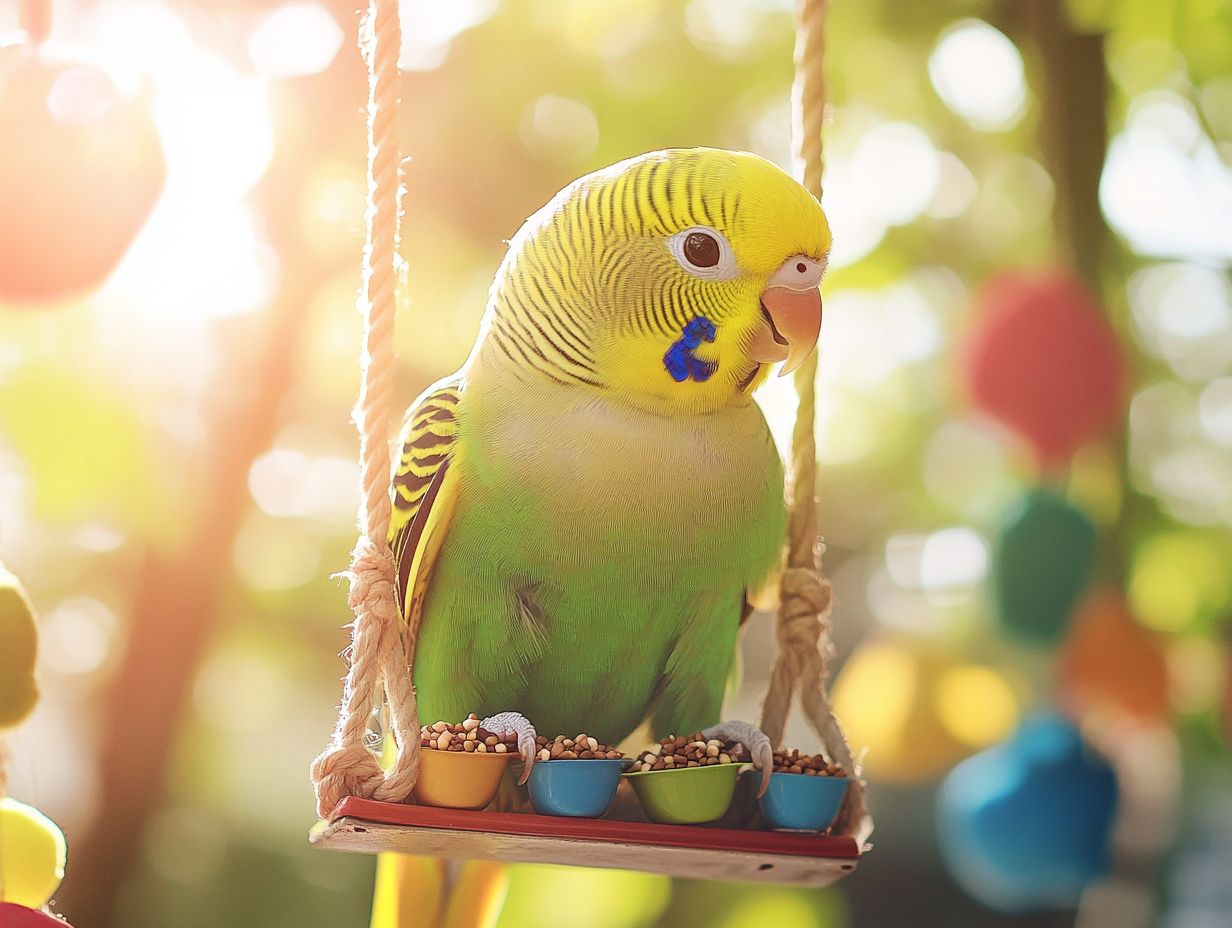
Yes, just like humans, parakeets have unique personalities and can display a wide range of behaviors and traits.
How can I tell if my parakeet is happy or stressed?
Parakeets express their emotions through body language. Signs of a happy parakeet include singing, playing, and preening, while a stressed parakeet may show behaviors such as excessive screaming or feather plucking.
Can a parakeet’s personality change over time?
Yes, a parakeet’s personality can change over time due to experiences and interactions with their environment and other birds. They are also known to undergo hormonal behavior changes during specific times of the year.
Are there any common personality traits among parakeets?
While every parakeet is unique, there are some common traits that many parakeets share, such as being social, curious, and playful.
How can I help my parakeet develop a well-rounded personality?
Your parakeet needs a fun and safe home.
Regular bonding time with you and a healthy diet will help shape their personality.



